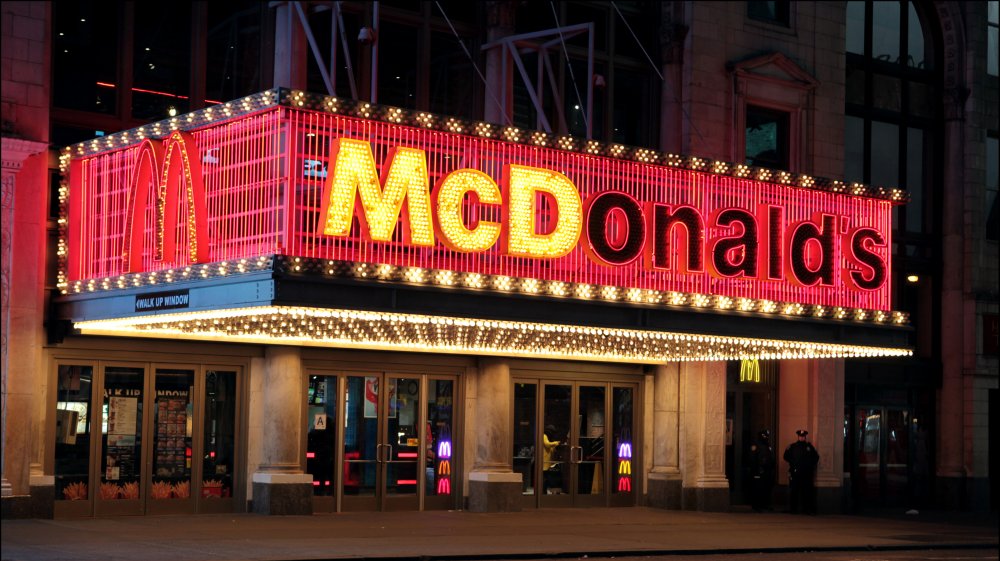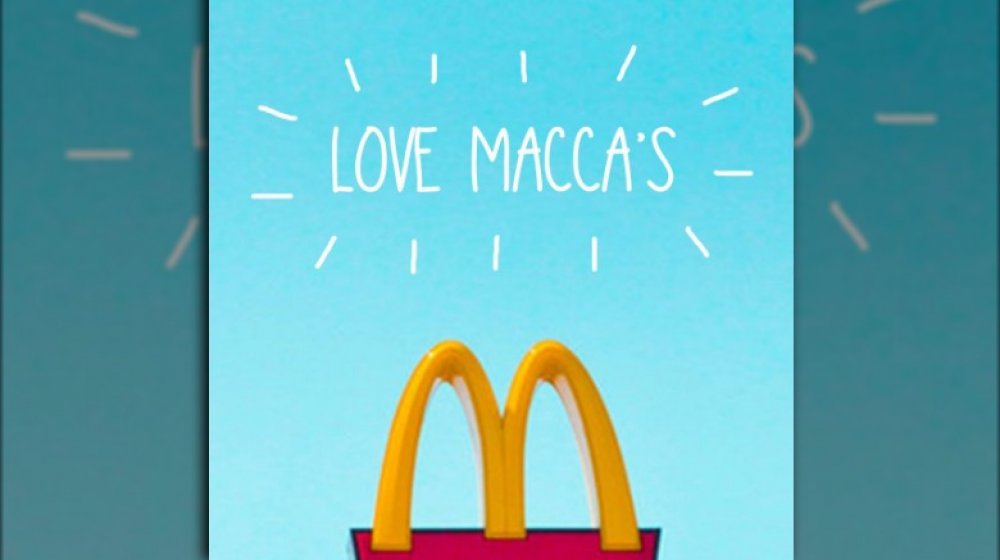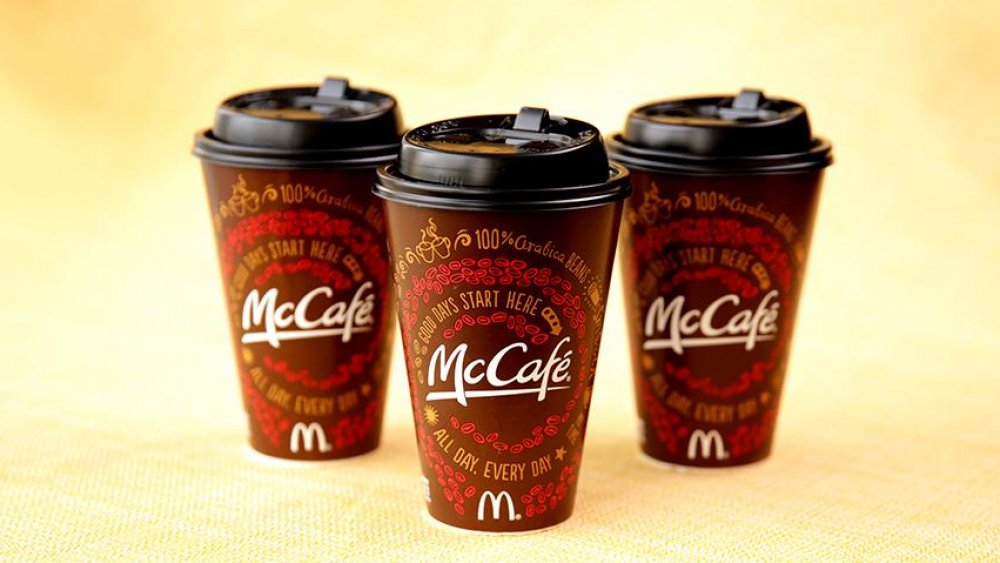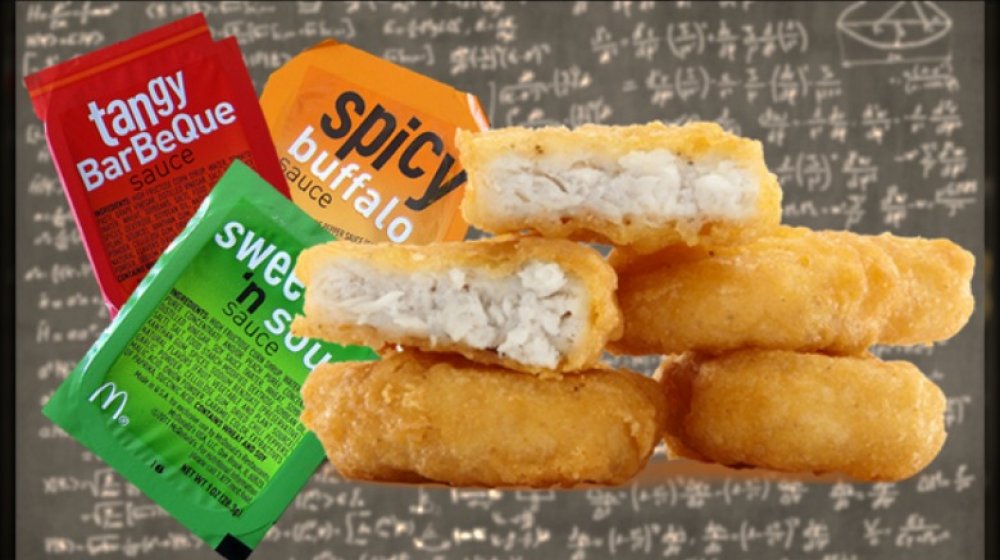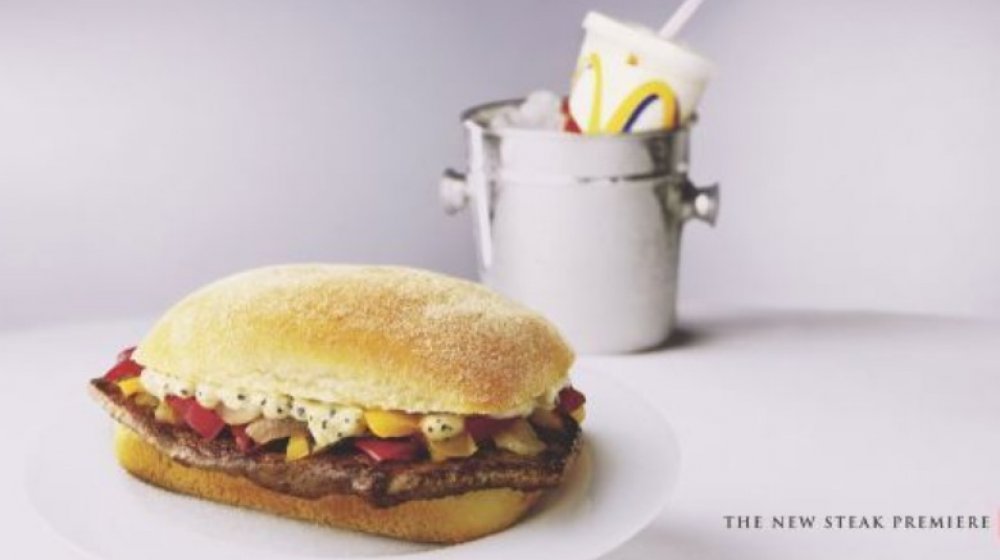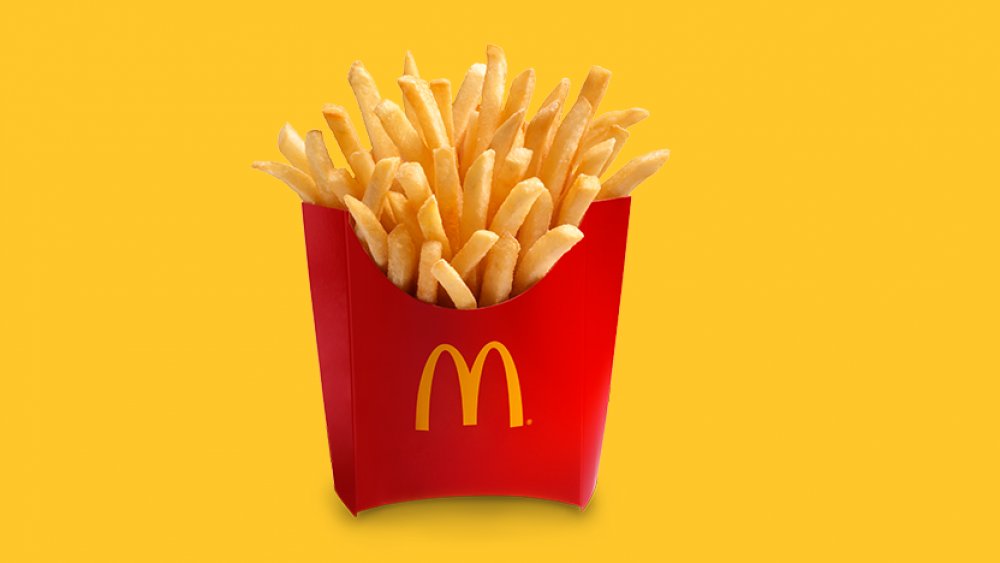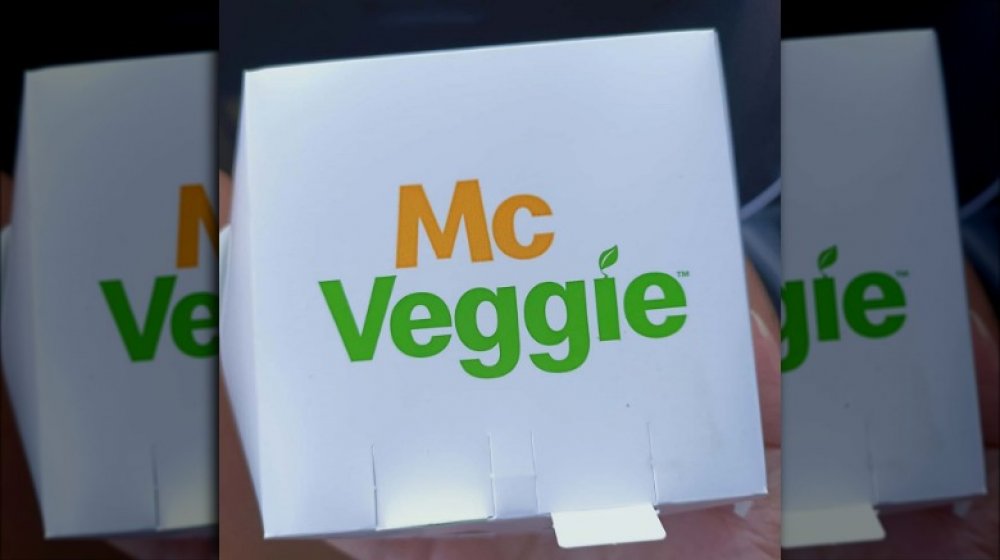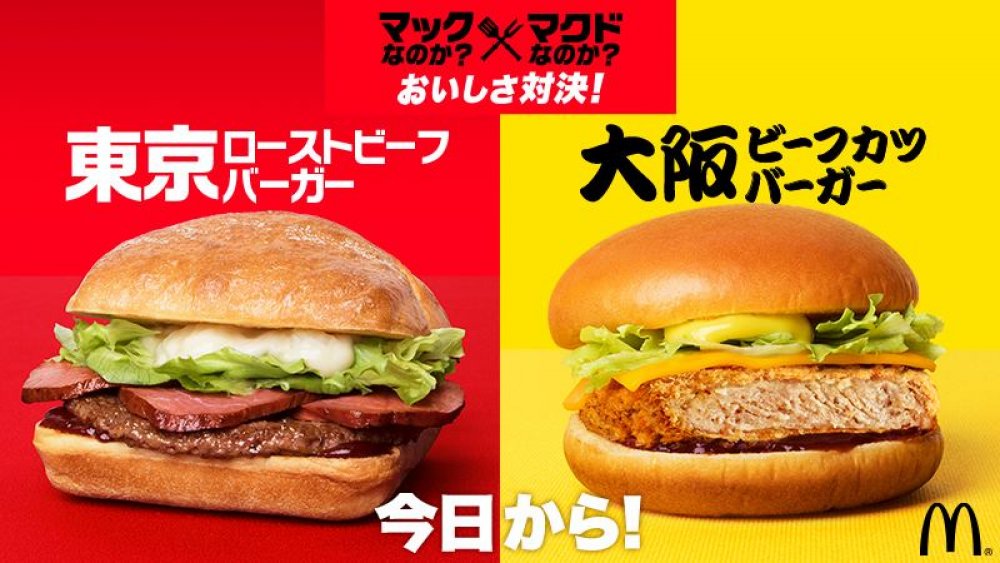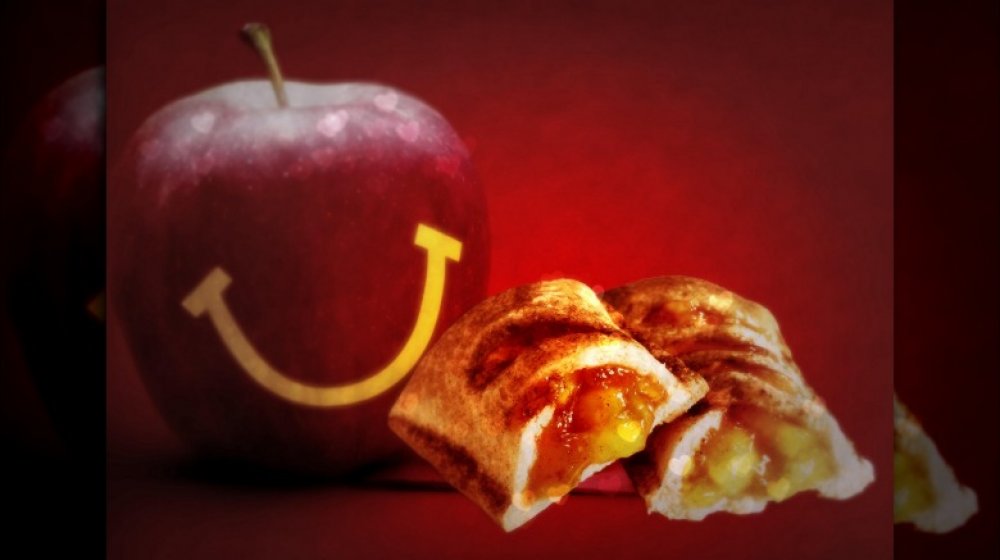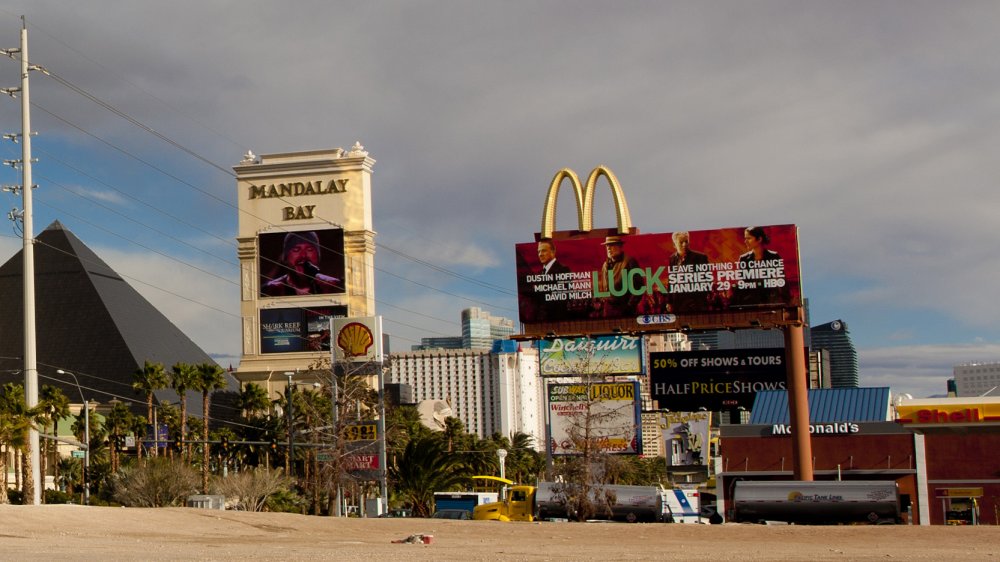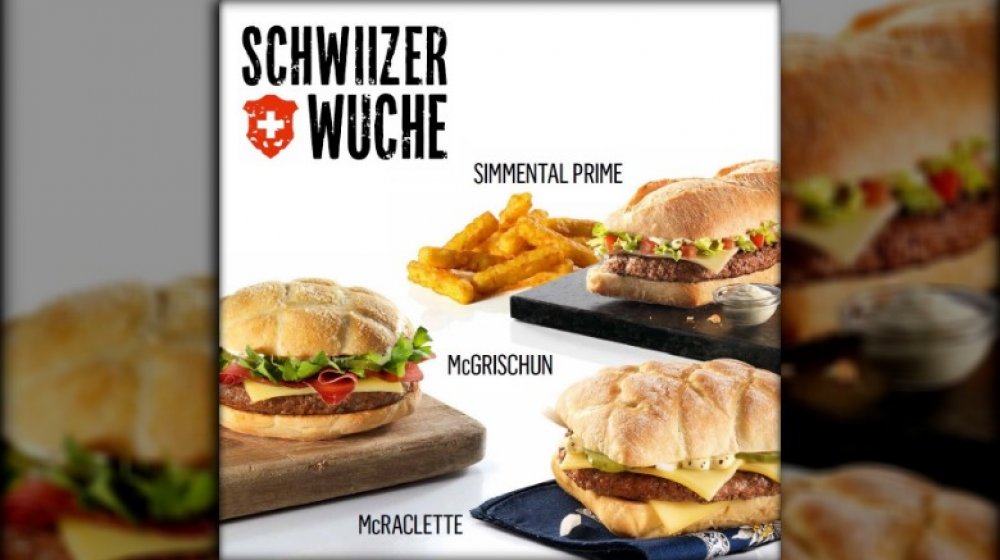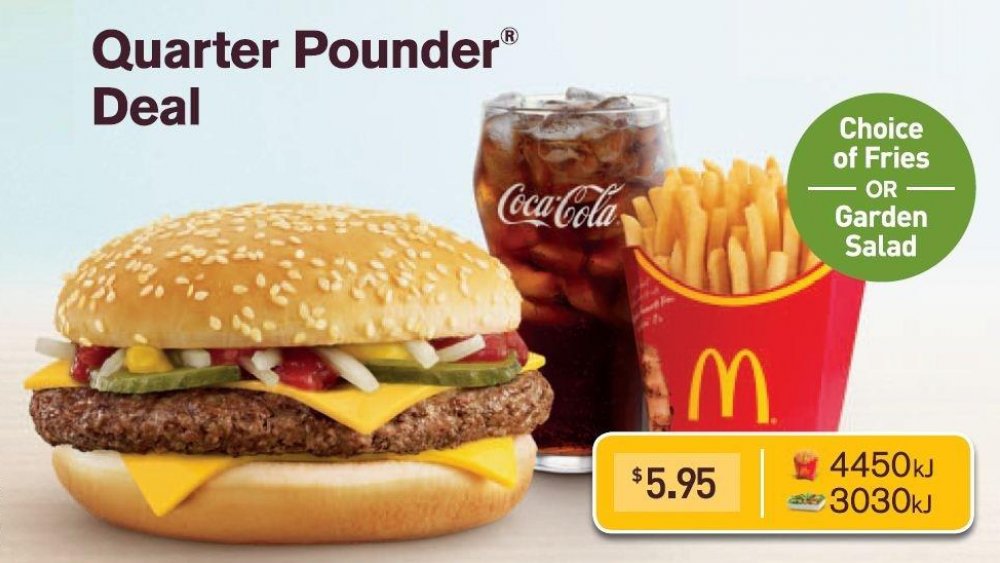Times McDonald's Lied To Your Face
Throughout McDonald's relatively short history, this joint has slapped the phrase "Mc" in front of many a word that didn't need bedazzling. For instance, WLWT reported that they decided to refer to their pizzas as McPizzas back in the 1980s. According to YourDictionary, this noun was around in 997 AD, so who would have thought that it require two extra letters? That being said, Mickey D's has done more than just call their wraps McWraps or name its muffins McMuffins. They have also lied to us all on numerous occasions.
That's right, the Golden Arches hasn't been the most innocent uber-wealthy corporation. Across multiple countries and decades, they have told plenty of whoppers. But what did this company fib about? And did they ever get caught in the act? Moreover, did McDonald's ever own up to creating a fabrication? Well, keeping reading on after this sentence concludes and find out!
McDonald's Australian 'grilled' chicken burger ad was a sham
For an item in this world to be classified as grilled chicken, it needs to meet two pieces of criteria. Firstly, it has to be grilled. Secondly, it has to be chicken. If a product does not get 100 percent on this test, then it has automatically failed.
In 1999, the Australian Competition and Consumer Commission (ACCC) believed that the chicken patties on McDonald's Grilled Chicken Burgers weren't actually grilled. In fact, they had the authority to make the Golden Arches stop describing this meal as such. The ACCC discovered that McDonald's patties were instead cooked in an oven. These items were then branded with grill marks, chilled, and moved into their fast food eateries. Before this product was served to a customer, it was cooked in between a pair of hot plates that could be pressed together.
This report didn't defend McDonald's actions. It stated, "The ACCC believes the extensive advertising of the burger as 'grilled' constituted misleading or deceptive conduct." This commission also disclosed that McDonald's agreed to stop advertising these burgers as grilled.
McDonald's corporate lawyers distorted the facts of a case
In the show Adam Ruins Everything, the main character, Adam Conover, explains why Stella Lieback took McDonald's to court. Lieback was in a parked car when she spilled a cup of the restaurant's coffee onto her lap. Her drink was 190 degrees Fahrenheit, gave her third-degree burns in multiple areas, and could have potentially killed her. Lieback admitted that the spill was her fault. However, the beverage she was served should have never been that temperature.
Conover also outlines that McDonald's refused to cover Lieback's medical expenses. She had accrued $20,000 worth of bills and wanted this company to assist her in paying it off. But McDonald's wasn't helpful. They tried to pay her a measly $800 before refusing to make a more supportive deal. Conover states, "They gave her no choice but to go to court."
Adam Ruins Everything then went onto say that the jury thought that McDonald's had wronged Lieback. "In the end," Conover exclaims, "Stella settled for less than six hundred grand." Now, this corporation was acting absolutely awful, and we haven't even touched on how their law team lied. Conover remarks, "Those corporate lawyers are really good at their jobs. They spent years running a disinformation campaign to convince Americans that there was an epidemic of frivolous lawsuits, and the media bought it." This program then plays a montage of TV clips that frame Lieback as the person at fault for the trial.
McDonald's Hong Kong corrected a false claim that they made
In 2014, The New York Times reported that Shanghai Husi Food was accused of creating fast food products out of expired meat. This plant also allegedly made up production dates for the smoked beef patties that they vended. The whole situation was so catastrophic that the place was forced to come to a standstill.
The same day that The New York Times' article came out, South China Morning Post published a piece entitled, "McDonald's misled Hong Kong food safety authority about rotten meat, says official." This publication noted that the aforementioned fast food company originally claimed that it had received items from Husi's Hebei plant and didn't get anything from the factory in Shanghai. Nevertheless, when the government stopped all Husi products from being sold, McDonald's backtracked. It admitted to receiving food from the disgraced location.
South China Morning Post additionally mentioned that McDonald's issued two apologies for not disclosing this information. In the first one, they said sorry for being "confusing," and in the second one, they said sorry for providing a "lack of clarity." That notwithstanding, this institution declined to answer any questions about the incorrect claim that they made.
McDonald's UK made a misleading Steak Premiere ad
Have you ever watched a fast food ad, bought the very same menu item, and felt swindled because your dish didn't look like it did in the promo? Well, if you have, there's a chance that you're not alone. Back in 2003, the BBC stated that four McDonald's UK customers weren't content with a limited-time sandwich called the Steak Premiere. These patrons felt like what they'd bought wasn't as well-appointed as its commercial counterpart, so they took their grievances to the Independent Television Commission. And what happened next wasn't amazing for McDonald's.
The BBC relayed that the Independent Television Commission then proceeded to buy multiple Steak Premieres. After doing so, this organization concluded that their McDonald's sandwiches didn't use the TV ad amount of ingredients and that the company's video could be misconstrued. They also instructed the Golden Arches to stop playing their criticized plug.
McDonald's told the BCC in a statement that they disagreed with this call. They wrote, "In accordance with industry practice, when making this advert we followed the same guidelines, used the same equipment and used the same amount of ingredients as used by our restaurants every day when serving customers." They furthermore asserted that the Independent Television Commission agreed that these claims were legit.
McDonald's lied about what its fry are cooked in
In a 2002 article by CNN Money, the publication discussed the fact McDonald's fries and hashbrowns contain beef flavoring made out of meat. However, despite that being the case, the corporation described these products as being vegetarian in the 1990s. CNN Money outlined that McDonald's did this because the products were being cooked in mostly vegetable oil.
Because this disinformation was provided to the public, the Seattle Post-Intelligencer remarked that a Hindu attorney named Harish Bharti filed a class-action lawsuit against the fast food company. Bharti had taken an important Hindu man out to get McDonald's fries, and their religion prohibits its followers from eating beef. This attorney was mortified, and he expressed, "I was a host to this swami — a holy man — and I became responsible for feeding him something he would rather die than eat."
The Seattle Post-Intelligencer also communicated that McDonald's decided to settle. This corporation agreed to pay $10 million to vegetarian and Hindu organizations, make a couple of operational improvements, and apologize. Bharti attested that they would circulate the apology, and the Restaurant News Resource actually published this statement online. An excerpt of it reads, "McDonald's sincerely apologizes to Hindus, vegetarians and others for failing to provide the kind of information they needed to make informed dietary decisions at our U.S. restaurants." The chain also admitted that its French fries and hashbrowns were at times "improperly identified as vegetarian."
McDonald's Australia flat-out made up a tweet
It's probably not a smart idea to try and put your own words into someone else's mouth. Yet, Buzzfeed News reported that McDonald's Australia did just that. In 2019, Shane Bazzi tweeted at this chain, "Hey @maccas, when will you start catering for vegetarians and vegans? 2019 and still no veggie or vegan burgers." Bazzi also made several other posts that critiqued McDonald's for not accommodating these folks.
The very next year, McDonald's started selling McVeggie and McVeggie Deluxe burgers. They also published an ad for these products, which included a blurred picture of Bazzi and his first name. In their plug, it appears as if he's tweeted, "One day I'll bite into a @maccas veggie burger. One day." But there's a problem with this post, as Bazzi never made such a comment. Yup, the Golden Arches had totally misrepresented him. This frustrated Bazzi, and he told Buzzfeed News, "I found it quite cringey and weird to be honest. I was disappointed to have my words twisted."
A spokesperson for McDonald's toldBuzzfeed News that they did in fact compose this fake tweet. They responded, "We took inspiration from a handful of tweets. We blurred photos and did not use full names or direct quotes of any of the users who inspired this campaign." But Bazzi didn't think that this explanation was satisfactory. He said, "They should have contacted me before doing that and got permission."
McDonald's Japan ran misleading burger ads
In 2018, The Straits Times stated that Japan's Consumer Affairs Agency called out McDonald's for creating unreasonable advertisements. These promos were from the previous year and marketed the joint's Tokyo Roast Beef Burger. They also signaled that classic slices of beef were put into their buns. McDonald's promoted this belief by showing footage and images of its roast being cut from a larger segment of this product. Nevertheless, these shots weren't honest. More than fifty percent of their burgers actually contained reshaped beef.
Japan's Consumer Affairs Agency determined that these McDonald's advertisements had broken the law. This chain had made their burgers out to better than they really were, and thus, these promos had been specious. In a comment obtained byThe Straits Times, a McDonald's Japan spokesperson remarked, "We sincerely apologise for insufficiently explaining (the product)." One year later, Nippon noted that this marketing technique had resulted in them snagging a 21.71 million yen fine.
McDonald's employees might also fib
When you rock up to your local Happy Meal peddlers, you're most likely hoping that the workers won't mess with your order. But they would absolutely never do that, right? Well, an ex-McDonald's employee told Cosmopolitan about all the lies that they'd impart to their customers. For one thing, this person claimed that a server might say that they've sold every single apple pie, even if they're still stocked behind the counter. They disclosed that the staff would do this because these items take a long time to make.
This individual also admitted that the McDonald's staff would occasionally cut a Filet-o-Fish into three fish fingers. They'd do this to save time when they had to put together a Happy Meal. Furthermore, Cosmopolitan divulged that these workers would make vanilla milkshakes without any vanilla syrup in them. This would happen from time to time because the server didn't want to get a new container of glop ready. So, if you're ever ordering any of these items, you may want to check to verify that it's what you signed up for.
McDonald's punked Las Vegas musical auditioners
"We invited real people to audition for a new show on the Las Vegas Strip," reads the intro text on a Golden Arches ad. "The people are real. The show isn't." What follows after this prologue is a montage of people singing their hearts out, passionately dancing, and pretending to be the undead of all things. These auditioners don't seem to know that a zombie-themed musical, called Hunger In The Night, is a total fabrication. At the end of this clip, another typed sentence declares, "We did this to remind you ... McDonald's is open 24 hours."
The publication Grub Street wasn't all that impressed with this 2014 stunt. They contended that at least a few of these auditioners were hoping to land a real gig. This website also proposed that some people might not have attended McDonald's event if they knew they were being lied to. The article concluded by opining, "That release form you signed just gives McDonald's permission to use your likeness in its marketing material — probably not the role most people would have signed up for, given the choice."
McDonald's Schweiz ran a fictitious burger commercial
Here's a slightly fun fact: Schweiz is the German word for Switzerland! But what was the point of this tidbit? Okay, the McDonald's in Switzerland is occasionally called McDonald's Schweiz. And in 2012, The Local reported that this arm of McDonald's was required to pull a burger ad. So, while the above-mentioned article doesn't use this word, it can be enjoyable to state that Schweiz messed up. The item they were incorrectly promoting was called the Simmental Prime Burger. This product contained Simmental beef, Emmi cheese, and some other types of fodder.
According to The Local, McDonald's ad claimed that these burgers contained an Alpine cheese. But LID, the German-language agricultural information service, knew that this info was wrong. An alpine cheese must be produced from cows that reside in the Alps. This organization stated the Emmi cheese used in these burgers doesn't actually come from that region.
A spokesperson for McDonald's told LID that this incorrect statement took form after they'd "tried to shorten the advertising." They also promised the company would rework its ad campaign so the phrase Alpine cheese wouldn't be mentioned. Moreover, The Local reported that the Golden Arches apologized.
McDonald's didn't tell the truth about a sample budget journal
In 2013, ThinkProgress analyzed a McDonald's budgeting website. This publication said that the fast food chain collaborated with Visa to create some resources for its low-wage employees. These online tools were meant to help anyone that earned around $8.25 per hour successfully manage their money.
ThinkProgress wasn't very impressed with this resource. They believed that the website was designed to make a low-wage salary look reasonable, but it instead highlighted how surviving off $8.25 per hour can be incredibly difficult. ThinkProgress came to this conclusion after they looked at a McDonald's sample budget journal, which they described as "laughably inaccurate."
But made this example so incorrect? Well, ThinkProgress expressed that all the totals provided aren't at all realistic. They wrote, "Not only does the budget leave a spot open for 'second job,' it also gives wholly unreasonable estimates for employees' costs: $20 a month for health care, $0 for heating, and $600 a month for rent. It does not include any budgeted money for food or clothing."
A McDonald's spokesperson responded to ThinkProgress' critique by expounding, "The samples that are on this site are generic examples and are intended to help provide a general outline of what an individual budget may look like." However, this explanation doesn't hold up. There's nothing generic about a money plan that assumes its end user won't eat.
A McDonald's Australia ad exaggerated a burger's size
How long does it take McDonald's to get a Quarter Pounder flawless for an ad campaign? Furthermore, how long does it take this company to create the same type of dish in a restaurant? If both of these questions have gnawed away at your insides throughout the years, then prepare to be potentially freed from your suffering. Because in 2014, Lifehacker obtained a McDonald's promotional graphic that claimed it took approximately four hours to get a burger campaign ready, while it only took approximately three minutes to get this product constructed in a restaurant.
Sandwiched between this information on the promo was a shoulder-to-shoulder comparison of these two products, and the spruced-up Quarter Pounder looked more photogenic. But while it's nice that McDonald's acknowledged that they stylize their burgers, this post wasn't 100 percent honest. Lifehacker also reposted a blurb for this graphic, which asserted, "The burgers seen in the images are the same size with the same ingredients." However, in McDonald's own comparison, the sculpted item looked bigger. Its layer of veggies seemed taller, and the bun appeared plumper. By distorting the size of one of the burgers somehow, this chain has distorted the truth.
